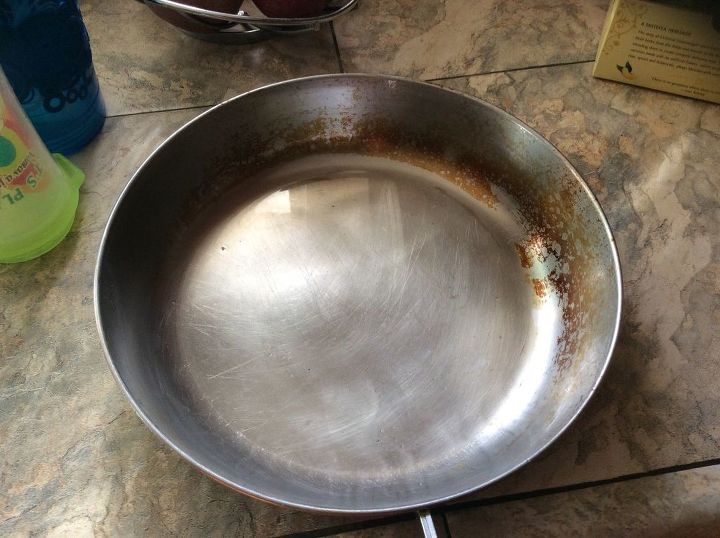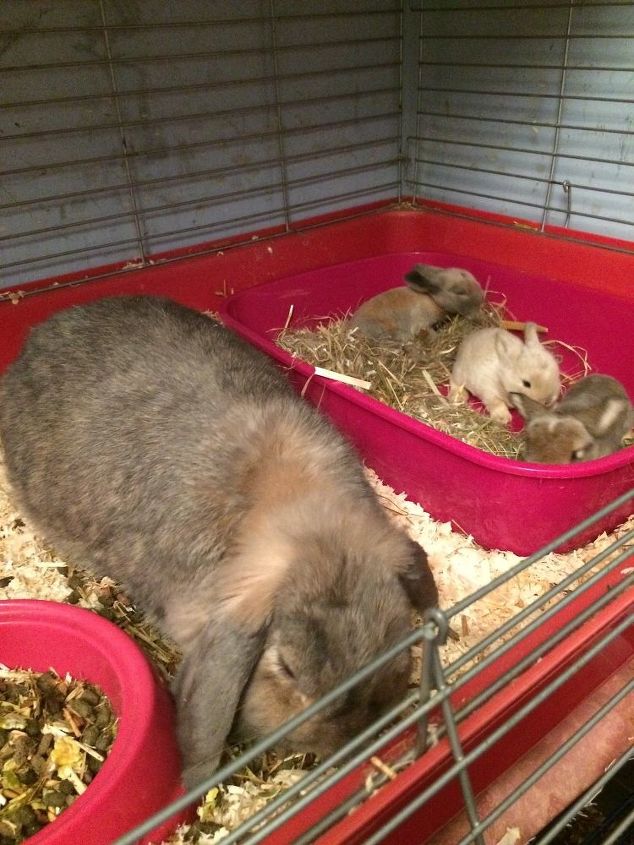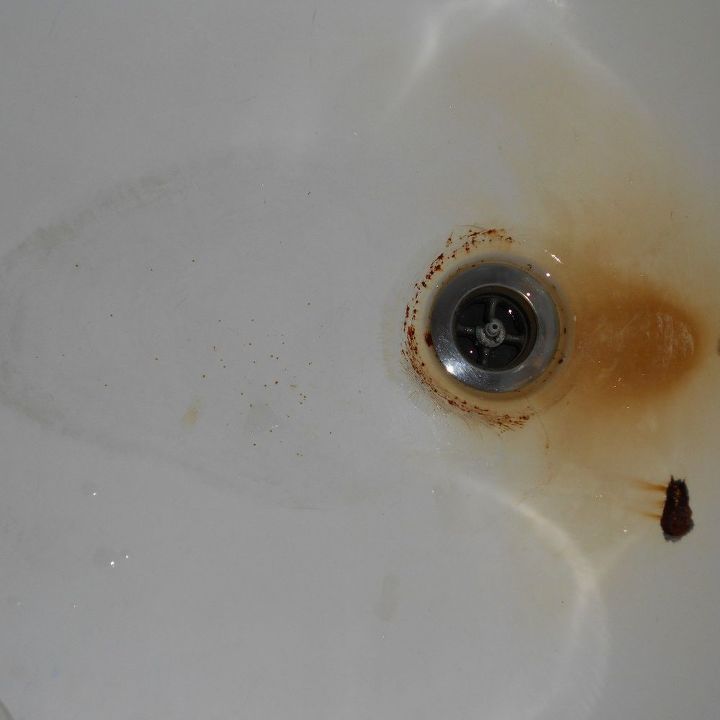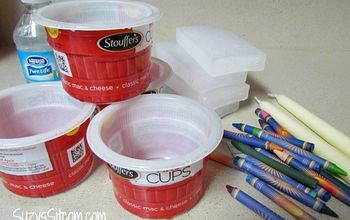Is there a home remedy spray that prevent pets from peeing on carpet?
Related Discussions
How to clean a mirror without streaks?
Every time I clean my mirrors, they end up having tons of streaks and almost look worse than before I started. What could I use to clean them that won't leave streaks... See more
How to clean burns on stainless steel pans?
Help! I burned my pan. How do I clean stainless steel cookware that's been burned?
How to clean shower doors
How to clean glass shower doors
How to clean my kitchen cabinets from grease?
My kitchen cabinets are embarrassingly greasy. Please share your degreasing tips with me so I don't have to cringe every time I glance at my cabinets.
How to clean hardwood floors in the kitchen?
What is the best way to clean hardwood floors in the kitchen?
How to kill flies with out harming my indoor rabbits.
I have 50 bunnies that live indoors. They all live in hutches. They are cleaned out religiously 2 times a week in the winter and everyday in the summer. Flies can be... See more
How do I clean a rusty bathtub?
There are several metallic stains and other stains that bleach and lime remover don't remove. Part of the ceramic coat is gone! Any help, please. I'm sure my landlord... See more




you will have to get rid of the old pee smell first. I would soak it with vinegar and then remove the vinegar and let it dry. That may have to be repeated. The pet will continue using it as long as the old smell remains.
If you can catch the pet doing it, spray with water, All animals hate being sprayed. Enough times and the pet will stop.
or get rid of carpet....
Most animals will avoid citrus scents and Rue, but the latter would not be a smell you'd want on your carpets.
Dogs don't like the scent of rubbing alcohol, ammonia, lemon juice and vingar, and cats really don't like any citrus smells. Simply add to a spray bottle and use this to deter them both.
Use an enyzme cleaner made for pet odors and stains to remove any old urine smells. It is much more effective than vinegar. Vinegar will mask the smell for a while but it will not remove the bacteria that causes the smell. Your pets will pee where they can smell urine. There is nothing that will offer prevention for any pets from EVER peeing in the house. Training your pet to pee outdoors is your best solution but any small puppy or cat may have accidents while they are learning. Cleaning up their accidents immediately with the enzyme cleaner--following the directions--is your best bet. Natures's Miracle is one pet enzyme cleaner.
https://getcleaningdone.com/best-enzyme-cleaner-for-cat-urine
They do sell a bitter apple spray at any pet store. Sometimes it works, sometimes it doesn't. Have they been trained? If dogs, are they taken out every couple of hours? Any health issues? Or possible undetected health issues? If male dogs, they could be marking territory.
https://wagwalking.com/training/stop-peeing-on-the-carpet
https://www.cuteness.com/article/spray-carpet-keep-dogs-peeing
https://www.care.com/c/questions/29834/why-is-my-house-trained-dog-peeing-on-all-our/
Cats will do this if their box is not kept clean.
Let your pets out regularly;teach/ train your pets not to go in house,it's up to you not them;clean the boxes more often/daily or get more/bigger litter boxes. Get your animals spayed and/or neutered. The only thing that will break down the uric acid to permanently remove the smell is an enzyme cleaner. The enzymes break down uric acid into carbon dioxide and ammonia, both gasses that then easily evaporate. This is why it is also essential to allow the enzyme cleaner to air dry. It needs the “natural” drying time to break down the uric acid salts, allowing the resulting gases to evaporate.
Not all enzyme cleaners are equally effective. Good enzyme cleaners are typically a bit more expensive. Cheap ones( Natures Miracle) will work, but need to be reapplied over and over (and probably end up costing as much as the more expensive enzyme cleaners). Enzyme cleaners this author is aware of that work well and reliably include Nok Out, Urine Off, and Anti-Icky Poo.
Of course any cleaner needs to be used properly. Most enzyme cleaners come in a spray bottle. This is deceptive, because just spraying a light layer of enzyme cleaner over a urine stain will not result in complete cleaning of that spot. Cat/dog pee wicks(spreads out/seeps into surrounding area), and unless the enzyme cleaner completely envelopes all of the cat/dog pee, even it won’t work. “Spraying” doesn’t work. Dousing, pouring, and soaking are required when cleaning up cat/dog urine.
To properly use an enzyme cleaner on a fresh stain:
1. Blot up as much of the urine as you can before applying anything.
2. Soak the affected area with the enzyme cleaner.
3. Let the enzyme cleaner sit for 10 to 15 minutes.
4. Blot up as much of the enzyme cleaner as possible.
5. Leave the enzyme cleaner to air dry.
Covering the area loosely with something is always a good idea. This will not only help prevent the cat/dog from attempting to pee on the same spot while the enzyme cleaner does its work; it will stop family members from stepping or sitting on the wet spot. Some people lay aluminum foil down over the area; other recommendations include an upside down laundry basket or an aluminum baking sheet.
The same basic procedures apply for an old stain. But be aware that an old stain may require two or three full cycles of enzyme cleaner application (allowing it to completely dry between applications) in order to completely clean the stain.
THIS IS FOR DOGS & CATS BOTH.......it is absolutely essential to use a cleaner that can break down the uric acid. When urine dries, the urea is broken down by the bacteria. This is what makes it smell like ammonia. As it decomposes further, it releases thiols that make the odor worse. (It is the thiols in skunk spray that make it SO potent and difficult to remove).
The urea and urobilin/urobilinogin are not hard to clean. Urea, urobilin/urobilinogin, creatinine and the pheromones are water soluble (urobilin is the pigment that causes the color). Traditional household or carpet cleaners will deal with these, and this is why hydrogen peroxide, vinegar, and/or baking soda also appear (initially) to be effective at eliminating the problem. But the problem has not been solved! Uric acid and its salts have been left behind. Uric acid is not water soluble and bonds tightly to whatever surface it touches.Soap, vinegar, baking soda, ammonia, chlorine, and hydrogen peroxide (to name the most common cleaners) simply are not chemically capable of breaking down the uric acid in cat pee. These cleaners and deodorizers only temporarily make the smell go away and appear to work because they do clean up the other components of the urine. But when exposed to humidity, the uric acid salts cause the uric acid crystals to reform. This process releases the smell again; not always at levels detectable to the human nose, but the cats’ more sensitive noses can smell it. And the scent of their urine outside of the litter box encourages many cats to continue urinating outside of the box, often with their families left scratching their heads wondering why,or dogs lifting their legs on furniture corners.
The only thing that will break down the uric acid to permanently remove the smell is an enzyme cleaner. The enzymes break down uric acid into carbon dioxide and ammonia, both gasses that then easily evaporate. This is why it is also essential to allow the enzyme cleaner to air dry. It needs the “natural” drying time to break down the uric acid salts, allowing the resulting gases to evaporate.
Not all enzyme cleaners are equally effective. Good enzyme cleaners are typically a bit more expensive. Cheap ones(natures miracle) will work, but need to be reapplied over and over (and probably end up costing as much as the more expensive enzyme cleaners). Enzyme cleaners this author is aware of that work well and reliably include Nok Out, Urine Off, and Anti-Icky Poo.
Of course any cleaner needs to be used properly. Most enzyme cleaners come in a spray bottle. This is deceptive, because just spraying a light layer of enzyme cleaner over a urine stain will not result in complete cleaning of that spot. Cat/dog pee wicks(spreads seeping outward), and unless the enzyme cleaner completely envelopes all of the cat/dog pee, even it won’t work. “Spraying” doesn’t work. Dousing, pouring, and soaking are required when cleaning up cat urine.
To properly use an enzyme cleaner on a fresh stain:
1. Blot up as much of the urine as you can before applying anything.
2. Soak the affected area with the enzyme cleaner.
3. Let the enzyme cleaner sit for 10 to 15 minutes.
4. Blot up as much of the enzyme cleaner as possible.
5. Leave the enzyme cleaner to air dry.
Covering the area loosely with something is always a good idea. This will not only help prevent the cat from attempting to pee on the same spot while the enzyme cleaner does its work; it will stop family members from stepping or sitting on the wet spot. Some people lay aluminum foil down over the area; other recommendations include an upside down laundry basket or an aluminum baking sheet.
The same basic procedures apply for an old stain. But be aware that an old stain may require two or three full cycles of enzyme cleaner application (allowing it to completely dry between applications) in order to completely clean the stain.